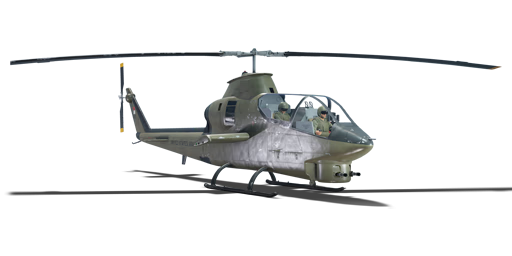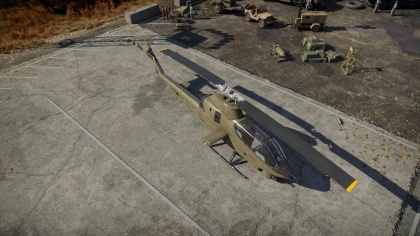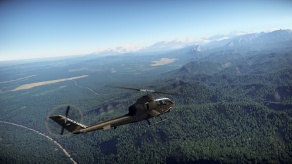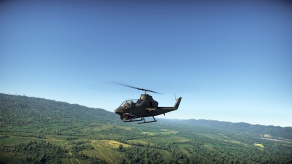Difference between revisions of "AH-1G"
Inceptor57 (talk | contribs) m |
|||
| (10 intermediate revisions by 6 users not shown) | |||
| Line 10: | Line 10: | ||
[[File:GarageImage_{{PAGENAME}}.jpg|420px|thumb|left]] | [[File:GarageImage_{{PAGENAME}}.jpg|420px|thumb|left]] | ||
{{break}} | {{break}} | ||
| − | The '''{{Specs|name}}''' is a Rank {{Specs|rank}} USA attack helicopter {{Battle-rating}}. This helicopter was introduced in [[ | + | The '''{{Specs|name}}''' is a Rank {{Specs|rank}} USA attack helicopter {{Battle-rating}}. This helicopter was introduced in [[Update 1.81 "The Valkyries"]]. |
| − | This helicopter, being the first Attack Helicopter in the American Tech Tree, is a | + | This helicopter, being the first Attack Helicopter in the American Tech Tree, is a manoeuvrable and powerful beast if used in the right hands. It has 7 armaments presets, most of which need to be researched. The AH-1G comes with one secondary weapon, 28 x Hydra-70 rockets. |
== General info == | == General info == | ||
=== Flight Performance === | === Flight Performance === | ||
| − | ''Describe how the aircraft behaves in the air. Maximum speed, | + | ''Describe how the aircraft behaves in the air. Maximum speed, manoeuvrability, speed and allowable loads - these are the most important characteristics of the vehicle.'' |
{| class="wikitable" style="text-align:center" | {| class="wikitable" style="text-align:center" | ||
| Line 46: | Line 46: | ||
=== Survivability and armour === | === Survivability and armour === | ||
<!--Examine the survivability of the helicopter. Note how vulnerable the structure is and how secure the pilot is, how many engines the vehicle has. Describe the armour, if there is any, also mention the vulnerability of other critical aircraft systems.--> | <!--Examine the survivability of the helicopter. Note how vulnerable the structure is and how secure the pilot is, how many engines the vehicle has. Describe the armour, if there is any, also mention the vulnerability of other critical aircraft systems.--> | ||
| + | |||
* 12 mm steel - engine | * 12 mm steel - engine | ||
* 20 mm composite boron-carbide - pilot/gunner seats | * 20 mm composite boron-carbide - pilot/gunner seats | ||
| Line 54: | Line 55: | ||
=== Offensive armament === | === Offensive armament === | ||
<!--Describe the offensive armament of the aircraft, if any. Describe how effective the cannons and machine guns are in a battle, and also what belts or drums are better to use. If there is no offensive weaponry, delete this subsection.--> | <!--Describe the offensive armament of the aircraft, if any. Describe how effective the cannons and machine guns are in a battle, and also what belts or drums are better to use. If there is no offensive weaponry, delete this subsection.--> | ||
| − | {{main|M134 Minigun (7.62 mm)}} | + | {{main|M134 Minigun (7.62 mm)|M129 (40 mm)}} |
The AH-1G can carry up to 4 x 7.62 mm miniguns with a very generous ammo supply allowing it to put out an extremely dense amount of fire over an extended period. This should be used to the pilot's advantage when engaging enemy aircraft in the skies. | The AH-1G can carry up to 4 x 7.62 mm miniguns with a very generous ammo supply allowing it to put out an extremely dense amount of fire over an extended period. This should be used to the pilot's advantage when engaging enemy aircraft in the skies. | ||
| + | |||
| + | The standard armament of the AH-1G can be switched for a dual 40mm M129 grenade launcher (can be researched as a tier III modification). | ||
=== Suspended armament === | === Suspended armament === | ||
| Line 68: | Line 71: | ||
* 2 x 7.62 mm M134 Minigun machine gun (3,000 rpg) + 38 x FFAR Mighty Mouse rockets | * 2 x 7.62 mm M134 Minigun machine gun (3,000 rpg) + 38 x FFAR Mighty Mouse rockets | ||
| − | Unlike other AH series helicopters, the AH-1G can equip either two 7.62 mm Miniguns or one 20 mm | + | Unlike other AH series helicopters, the AH-1G can equip either two 7.62 mm Miniguns or one 20 mm Gatling gun as suspended armaments. The minigun can pack a real punch when engaging enemy helicopters due to their light armour, however, the one drawback will be the pilot will have to deal with the massive recoil from the fast rate of fire. |
The AH-1G can also serve in a ''ground pounding'' role by equipping '''FFAR''' rockets that can reload quite quickly while still being able to defend itself with its turret miniguns. While the AH1G cannot carry as much ordinance as its Soviet counterparts, it can defend itself very well and even equip suspended armament such as rockets, something which the Soviet choppers cannot do until BR 9.7. | The AH-1G can also serve in a ''ground pounding'' role by equipping '''FFAR''' rockets that can reload quite quickly while still being able to defend itself with its turret miniguns. While the AH1G cannot carry as much ordinance as its Soviet counterparts, it can defend itself very well and even equip suspended armament such as rockets, something which the Soviet choppers cannot do until BR 9.7. | ||
| Line 74: | Line 77: | ||
== Usage in battles == | == Usage in battles == | ||
<!--Describe the tactics of playing in the helicopter, the features of using vehicles in a team and advice on tactics. Refrain from creating a "guide" - do not impose a single point of view but give the reader food for thought. Examine the most dangerous enemies and give recommendations on fighting them. If necessary, note the specifics of the game in different modes (AB, RB, SB).--> | <!--Describe the tactics of playing in the helicopter, the features of using vehicles in a team and advice on tactics. Refrain from creating a "guide" - do not impose a single point of view but give the reader food for thought. Examine the most dangerous enemies and give recommendations on fighting them. If necessary, note the specifics of the game in different modes (AB, RB, SB).--> | ||
| − | In helicopter battles, the AH-1G serves best in an anti-air role by combating other enemy helicopters. Due to being the only dedicated attack helicopter for the first half of the USA helicopter tree it serves as the backbone for eliminating enemy air threats for US pilots until the AH-1F and AH-1Z become researchable. | + | [[File:AH-1G Test fly.jpg|thumb|292x292px|A brief test fly screenshot]] |
| + | [[File:AH-1G .jpg|alt=Brief test fly screenshot.|thumb|292x292px]] | ||
| + | In helicopter battles, the AH-1G serves best in an anti-air role by combating other enemy helicopters. Due to being the only dedicated attack helicopter for the first half of the USA helicopter tree, it serves as the backbone for eliminating enemy air threats for US pilots until the AH-1F and AH-1Z become researchable. | ||
| + | |||
| + | The AH-1G is sluggish when it comes to climbing rate. This results in the vehicle being very manoeuvrable at low altitudes. Players should always save rockets for enemy vehicles that need it. | ||
| − | + | In-ground realistic battle, the AH-1G has the best loadout for 8.0 helicopter. The twin 40 mm grenade launcher is the best for dealing with tanks at a close range battle but should be very careful of any tanks or SPAA. | |
=== Pros and cons === | === Pros and cons === | ||
| Line 87: | Line 94: | ||
* Can equip several Hydra rocket pods, miniguns, and cannon as payload | * Can equip several Hydra rocket pods, miniguns, and cannon as payload | ||
* Miniguns do not jam unlike conventional guns | * Miniguns do not jam unlike conventional guns | ||
| + | * Twin 40mm grenade launchers are very effective against a tank, even at high ranks | ||
| + | * Has the best CAS capability for a starting helicopter | ||
'''Cons:''' | '''Cons:''' | ||
| Line 93: | Line 102: | ||
* Does not have any guided munitions | * Does not have any guided munitions | ||
* The 20 mm cannon gunpod has a lot of recoil which can throw your aim off | * The 20 mm cannon gunpod has a lot of recoil which can throw your aim off | ||
| − | * Slow | + | * 40mm grenade has a slow travel speed, the pilot has to aim away from the enemy to hit |
| + | * Slow climb rate if using a heavy payload | ||
== History == | == History == | ||
| Line 99: | Line 109: | ||
Parallel to the development of the UH-1 transport helicopter, Bell was actively conducting research on helicopter gunship designs. This resulted in the creation of the “Iroquois Warrior”, a mockup of a gunship design based on components from the UH-1B Huey. The mockup was presented to interested Army officials in June 1962, resulting in a proof-of-concept contract later that year. Following the contract award, Bell created the Model 207 “Sioux Scout”, which was evaluated by the Army in early 1964. | Parallel to the development of the UH-1 transport helicopter, Bell was actively conducting research on helicopter gunship designs. This resulted in the creation of the “Iroquois Warrior”, a mockup of a gunship design based on components from the UH-1B Huey. The mockup was presented to interested Army officials in June 1962, resulting in a proof-of-concept contract later that year. Following the contract award, Bell created the Model 207 “Sioux Scout”, which was evaluated by the Army in early 1964. | ||
| − | Although impressed by the Model 207, the Army | + | Although impressed by the Model 207, the Army sought a larger and more powerful design, resulting in the creation of a new competition of which Bell was not a part of. Instead, Bell independently continued developing and refining their gunship design, eventually creating the Model 209 - a design that was a combination of the Iroquois Warrior mockup and the concepts behind the Model 207. |
Meanwhile, the ongoing Vietnam War sparked an urgent demand for dedicated attack helicopters. Although gunship versions of the UH-1 performed this role with relative success, the fact that they weren’t initially intended for this role somewhat limited their effectiveness. Back in the States, the Army’s ongoing competition produced no winning design as a result of technical and political difficulties. To quickly address their demand, the Army started looking for an interim design to act as a stopgap measure in 1965. | Meanwhile, the ongoing Vietnam War sparked an urgent demand for dedicated attack helicopters. Although gunship versions of the UH-1 performed this role with relative success, the fact that they weren’t initially intended for this role somewhat limited their effectiveness. Back in the States, the Army’s ongoing competition produced no winning design as a result of technical and political difficulties. To quickly address their demand, the Army started looking for an interim design to act as a stopgap measure in 1965. | ||
| − | Soon after testing of the Model 209 concluded in September 1965, the Army decided to award Bell with a manufacturing contract later that year. The contract officially put the Model 209 into production under the Army designation of UH-1H | + | Soon after testing of the Model 209 concluded in September 1965, the Army decided to award Bell with a manufacturing contract later that year. The contract officially put the Model 209 into production under the Army designation of UH-1H Huey Cobra but was later redesignated to AH-1G Cobra. |
The AH-1G Cobra entered service with the U.S. Army in 1967, participating mainly through the remainder of the Vietnam War as well as other conflicts. The AH-1G was retired from active service in the early 1980s, being replaced by newer models of the Cobra. | The AH-1G Cobra entered service with the U.S. Army in 1967, participating mainly through the remainder of the Vietnam War as well as other conflicts. The AH-1G was retired from active service in the early 1980s, being replaced by newer models of the Cobra. | ||
Revision as of 10:37, 22 October 2019
Contents
| This page is about the aircraft AH-1G. For other uses, see AH-1 (Family). |
Description
The AH-1G is a Rank V USA attack helicopter
with a battle rating of 8.7 (AB) and 8.0 (RB/SB). This helicopter was introduced in Update 1.81 "The Valkyries".
This helicopter, being the first Attack Helicopter in the American Tech Tree, is a manoeuvrable and powerful beast if used in the right hands. It has 7 armaments presets, most of which need to be researched. The AH-1G comes with one secondary weapon, 28 x Hydra-70 rockets.
General info
Flight Performance
Describe how the aircraft behaves in the air. Maximum speed, manoeuvrability, speed and allowable loads - these are the most important characteristics of the vehicle.
| Characteristics | |||
|---|---|---|---|
| Stock | |||
| Max Speed (km/h at 1,000 m) |
Max altitude (meters) | ||
| AB | RB | ||
| 261 | 255 | 3475 | |
| Upgraded | |||
| Max Speed (km/h at 1,000 m) |
Max altitude (meters) | ||
| AB | RB | ||
| ? | ? | 3475 | |
Survivability and armour
- 12 mm steel - engine
- 20 mm composite boron-carbide - pilot/gunner seats
When fighting the AH-1G, it is always a good bet to get the "High Ground" or altitude advantage of this vehicle. Try to strafe it and get around to its blinds spot, as it can't use the tail rotor effectively when moving. Always aim for the cockpit, as one the gunner is knocked out the turret becomes unusable. When coming up against a Cobra with gun pods, or and secondary weapons, know that the pilot can still fire these even if the Gunner in knocked out.
Armaments
Offensive armament
The AH-1G can carry up to 4 x 7.62 mm miniguns with a very generous ammo supply allowing it to put out an extremely dense amount of fire over an extended period. This should be used to the pilot's advantage when engaging enemy aircraft in the skies.
The standard armament of the AH-1G can be switched for a dual 40mm M129 grenade launcher (can be researched as a tier III modification).
Suspended armament
- 28 x FFAR Mighty Mouse rockets
- 76 x FFAR Mighty Mouse rockets
- 2 x 7.62 mm M134 Minigun machine gun (3,000 rpg)
- 1 x 20 mm M195 cannon (1,500 rpg)
- 2 x 7.62 mm M134 Minigun machine gun (3,000 rpg) + 14 x FFAR Mighty Mouse rockets
- 2 x 7.62 mm M134 Minigun machine gun (3,000 rpg) + 38 x FFAR Mighty Mouse rockets
Unlike other AH series helicopters, the AH-1G can equip either two 7.62 mm Miniguns or one 20 mm Gatling gun as suspended armaments. The minigun can pack a real punch when engaging enemy helicopters due to their light armour, however, the one drawback will be the pilot will have to deal with the massive recoil from the fast rate of fire.
The AH-1G can also serve in a ground pounding role by equipping FFAR rockets that can reload quite quickly while still being able to defend itself with its turret miniguns. While the AH1G cannot carry as much ordinance as its Soviet counterparts, it can defend itself very well and even equip suspended armament such as rockets, something which the Soviet choppers cannot do until BR 9.7.
Usage in battles
In helicopter battles, the AH-1G serves best in an anti-air role by combating other enemy helicopters. Due to being the only dedicated attack helicopter for the first half of the USA helicopter tree, it serves as the backbone for eliminating enemy air threats for US pilots until the AH-1F and AH-1Z become researchable.
The AH-1G is sluggish when it comes to climbing rate. This results in the vehicle being very manoeuvrable at low altitudes. Players should always save rockets for enemy vehicles that need it.
In-ground realistic battle, the AH-1G has the best loadout for 8.0 helicopter. The twin 40 mm grenade launcher is the best for dealing with tanks at a close range battle but should be very careful of any tanks or SPAA.
Pros and cons
Pros:
- Two miniguns have a very high rate of fire
- Fairly small target due to its small width dimension
- Can equip several Hydra rocket pods, miniguns, and cannon as payload
- Miniguns do not jam unlike conventional guns
- Twin 40mm grenade launchers are very effective against a tank, even at high ranks
- Has the best CAS capability for a starting helicopter
Cons:
- Limited traverse for the miniguns
- Does not have any guided munitions
- The 20 mm cannon gunpod has a lot of recoil which can throw your aim off
- 40mm grenade has a slow travel speed, the pilot has to aim away from the enemy to hit
- Slow climb rate if using a heavy payload
History
Parallel to the development of the UH-1 transport helicopter, Bell was actively conducting research on helicopter gunship designs. This resulted in the creation of the “Iroquois Warrior”, a mockup of a gunship design based on components from the UH-1B Huey. The mockup was presented to interested Army officials in June 1962, resulting in a proof-of-concept contract later that year. Following the contract award, Bell created the Model 207 “Sioux Scout”, which was evaluated by the Army in early 1964.
Although impressed by the Model 207, the Army sought a larger and more powerful design, resulting in the creation of a new competition of which Bell was not a part of. Instead, Bell independently continued developing and refining their gunship design, eventually creating the Model 209 - a design that was a combination of the Iroquois Warrior mockup and the concepts behind the Model 207.
Meanwhile, the ongoing Vietnam War sparked an urgent demand for dedicated attack helicopters. Although gunship versions of the UH-1 performed this role with relative success, the fact that they weren’t initially intended for this role somewhat limited their effectiveness. Back in the States, the Army’s ongoing competition produced no winning design as a result of technical and political difficulties. To quickly address their demand, the Army started looking for an interim design to act as a stopgap measure in 1965.
Soon after testing of the Model 209 concluded in September 1965, the Army decided to award Bell with a manufacturing contract later that year. The contract officially put the Model 209 into production under the Army designation of UH-1H Huey Cobra but was later redesignated to AH-1G Cobra.
The AH-1G Cobra entered service with the U.S. Army in 1967, participating mainly through the remainder of the Vietnam War as well as other conflicts. The AH-1G was retired from active service in the early 1980s, being replaced by newer models of the Cobra.
- From Devblog
Media
An excellent addition to the article will be video guides, as well as screenshots from the game and photos.
See also
Links to the articles on the War Thunder Wiki that you think will be useful for the reader, for example:
- reference to the series of the aircraft;
- links to approximate analogues of other nations and research trees.
External links
| USA helicopters | |
|---|---|
| Attack | |
| Black Hawk | MH-60L DAP |
| Choctaw | H-34 |
| Cobra | AH-1F · AH-1G · AH-1Z |
| SuperCobra | AH-1W |
| Kiowa | OH-58D |
| Little Bird | AH-6M |
| Apache | YAH-64 · AH-64A · ▃AH-64A Peten · AH-64A (GR) · AH-64D |
| Utility | |
| Huey | UH-1B · UH-1C · UH-1C XM-30 |







